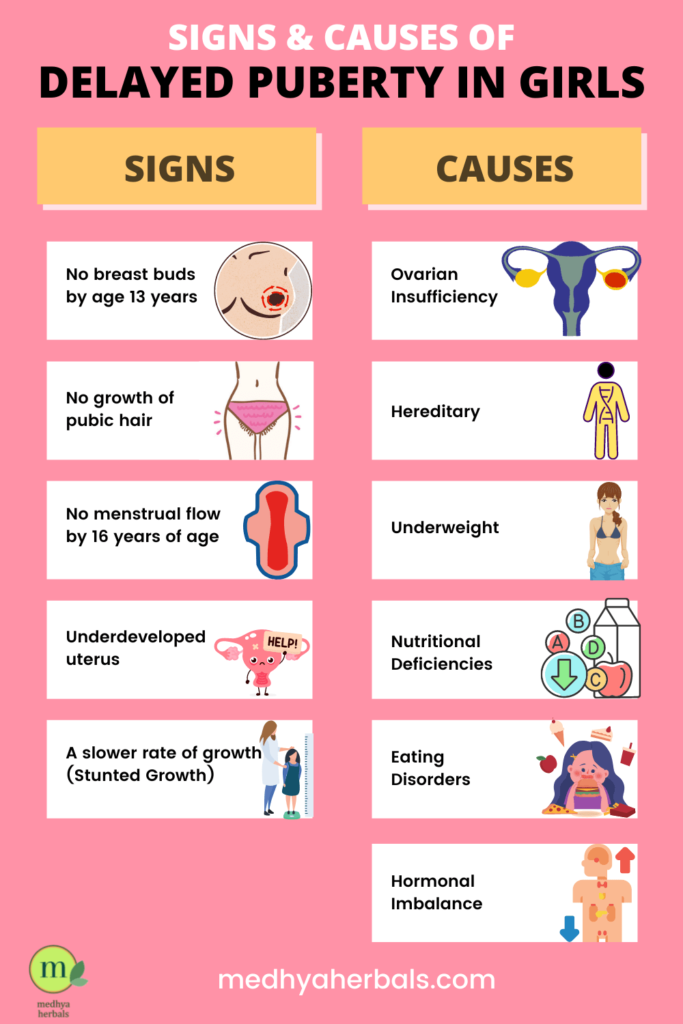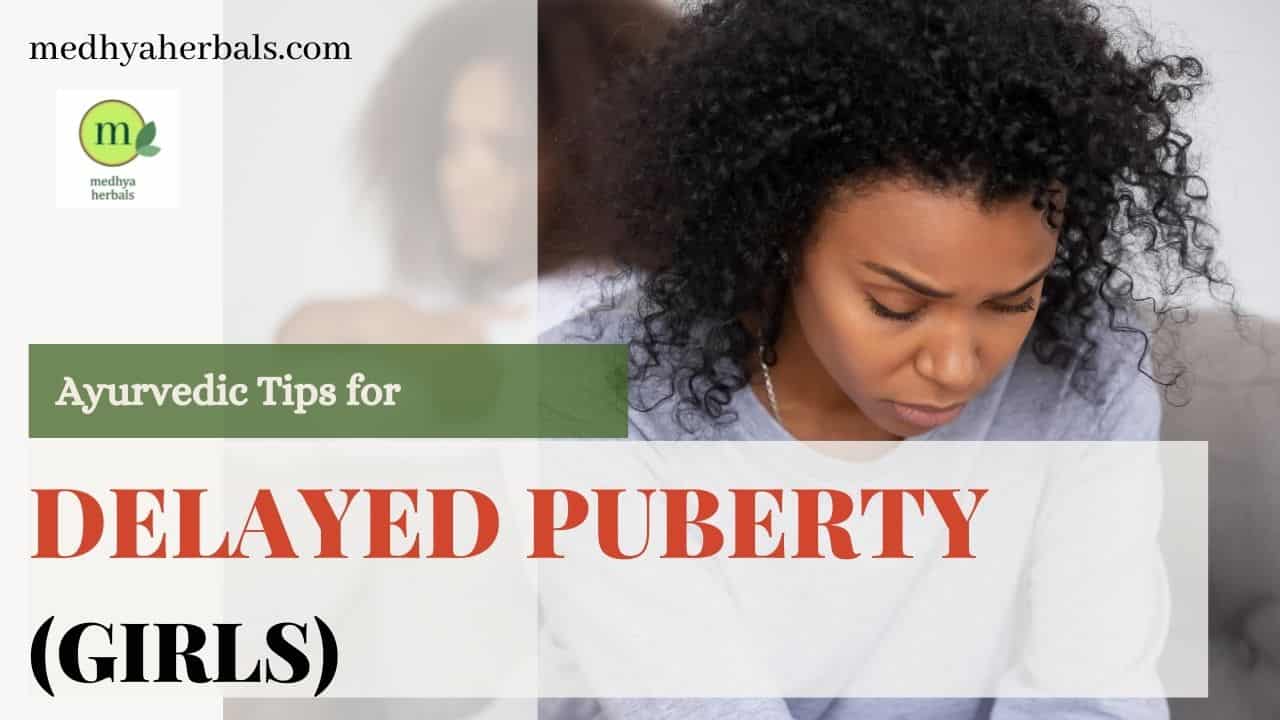It is not uncommon for girls to reach puberty later than their peers. In fact, puberty is considered normal if it occurs after the age of 13. However, some girls may start menstruating as late as 16 or 17 years old, which is considered delayed puberty.
As a mother, you may be wondering what you can do to prevent or manage delayed puberty in your daughter. There are a few things you can do from an Ayurvedic perspective to help encourage normal pubertal development.
Ayurveda is a holistic system of medicine that offers several effective tips to prevent and manage delayed puberty in girls. In this post, we will go through how you can support healthy growth in your child and save her from challenges of late puberty.
Delayed puberty in the Late Bloomers
Puberty begins when the pituitary gland begins to produce the luteinizing hormone (called LH) and follicle-stimulating hormone (called FSH). These two hormones cause the ovaries to enlarge and stimulate production of Estrogen and Progesterone.
How does delayed puberty affect girls?
There are a number of ways that delayed puberty can affect girls. One of the most significant is that it can cause emotional and social difficulties. Many girls feel self-conscious or embarrassed about being the only one in their class who hasn’t developed breasts or started menstruating. This can lead to low self-esteem and feelings of isolation. Additionally, delayed puberty can cause physical problems such as infertility later in life.
Diagnosis of Late Puberty
Late puberty is often diagnosed when a girl has not reached any pubertal milestones by the age of 13. However, it is important to keep in mind that pubertal timing can vary considerably from individual to individual, so delayed puberty should only be diagnosed after a comprehensive evaluation by a healthcare professional.
Signs of Late Puberty in Girls
Pubertal growth spurt starts shortly after breasts begin to develop in a girl. Usually, onset of menstruation (menarche) happens 2-3 years after appearence of breast buds.

A girl who has not started to have breast development by the age of 13 years is considered to be experiencing delayed puberty.
1. No breast buds by age 13 years
One of the first signs of approaching puberty is the development of breast buds. This happens a few years before the first period actually happens. That makes it an important time marker.
2. No growth of pubic hair
Hormones are produced in larger quantities at puberty. One of these hormones is testosterone. It is produced more in males, but there are still some quantities of it in females.
The ovaries and adrenals develop, and more testosterone is produced. This stimulates the growth of hair in private parts. Hair can be seen in the pubic area, and also in the armpit and inner thighs.
3. No menstrual flow by 16 years of age
The most commonly known sign of puberty in a girl is that she begins to menstruate, reaches Menarche. However, if you still don’t see anything by the age of 13 years, then a girl is experiencing delayed puberty.
4. Underdeveloped uterus
The womb should undergo changes during puberty. This is due to the production of more hormones like estrogen.
These changes are basically meant to prepare the womb to hold babies sometime in the future.
In late puberty, however, the womb doesn’t develop well enough. You might not be able to readily see this, but it is there.
5. A slower rate of growth (Stunted Growth)
You know, puberty is meant to prepare your body for adulthood. That is not only internally. The size of your body is also part of the normal growth process.
So, at puberty, there is a growth spurt. But, if you notice your mates are growing faster than you, it could be a sign of delayed puberty.
The hormones that are produced should induce that growth spurt. But for a late bloomer, this growth spurt will not occur. Most likely, the hormones that are supposed to induce it are not present.
Causes of Late Puberty in Girls
There are several reasons why a girl may experience delayed puberty. It could be due to a hormonal imbalance, slow growth, or an underlying medical condition. It is important to consult with a doctor to rule out any underlying causes.
Ovarian Insufficiency: One of the primary causes of delayed puberty is ovarian insufficiency, where the ovaries do not produce adequate levels of estrogen. This can be due to a variety of factors such as premature menopause, genetic defects, or autoimmune diseases.
Hereditary: In some cases, delayed puberty may be hereditary. This means that it runs in families and can be passed down from generation to generation.
Underweight/Malnutrition: Being underweight or malnourished can also delay the onset of puberty. This is because the body needs a certain amount of fat and nutrients to begin the pubertal process.
Eating Disorders: Eating disorders such as anorexia nervosa and bulimia can also cause delayed puberty. This is because these disorders interfere with the body’s ability to absorb nutrients, which are essential for pubertal development.
Hormonal Imbalance: Hormonal imbalances can also cause delayed puberty. This may be due to a variety of factors such as problems with the pituitary gland or thyroid gland.
What can you do about late puberty?
There are a number of reasons why girls may experience delayed puberty. It could be due to medical conditions such as Turner syndrome or precocious puberty, or it could simply be that she is a late bloomer. Whatever the reason, there are some things that you can do to help your daughter through this difficult time.
1. Talk to Your Child
First, it’s important to reassure your daughter that there is nothing wrong with her. She is just developing at a different pace than her friends. Explain to her that everyone is different and that she will reach all the milestones of puberty in due time.
It can also be helpful to talk to her about what she can expect to happen during puberty. Puberty is a time of great change, both physically and emotionally, so it’s important that she knows what to expect. This will help her to feel more prepared and less overwhelmed by the changes she is experiencing.
2. Ayurvedic Tips for Late Puberty in Girls

Delayed puberty is a tridoshic imbalance. It could be due to the high dominance of tamasa guna, abnormalities of beeja (the seed – ovum in this case), or a problem related to beejabhaga avayava (genetics, like in Turner’s syndrome.).
Thankfully, there are Ayurvedic approaches to late puberty. Just a few of them are thus:
1) Include foods that promote hormone balance in the diet
There are certain foods that help to balance hormones and promote healthy pubertal development. These include dairy products, leafy greens, nuts, and seeds. Girls who are delayed in puberty should make sure to include these foods in their diet.
2) Avoid processed and junk food
Processed and junk food can interfere with hormone balance and disrupt pubertal development. Therefore, it is best to avoid these foods if you want to prevent or manage delayed puberty.
3. Regular Exercise
Regular exercise helps to improve circulation and promote hormone balance. Encourage your daughter to exercise regularly.
Exercise can also help to promote production of the hormones that are responsible for pubertal changes. It also helps to reduce stress, which can be a trigger for delayed puberty.
At the same time, do note that excessive physical activity should be avoided at all times. It also induces stress and suppresses reproductive hormone function.
4. Reduce Stress
Stress can be a trigger for delayed puberty. Try to create a supportive and stress-free environment for your daughter. This may include limiting screen time, encouraging regular exercise, and providing emotional support.
5. Balanced Nutrition and Healthy Eating Habits
Help your daughter develop healthy eating habits from an early age. This includes teaching her about balanced nutrition and encouraging her to eat a variety of nutrient-rich foods.
6. Nutritional Supplements
If your daughter is not getting enough of certain nutrients from her diet, she may benefit from taking supplements. For example, iron is important for pubertal development, so iron supplements may be recommended if her diet is lacking in this nutrient.
7. Maintain a Healthy Weight
Ensuring that your daughter maintains a healthy weight is one of the best things you can do to prevent delayed puberty. A healthy weight allows the body to reach its full potential and develop normally.
Takeaway
It can be really tough dealing with delayed puberty, especially when all your daughter’s friends seem to be hitting milestones that she’s not. But don’t worry, there are things you can do to help prevent or manage delayed puberty. Late bloomer doesn’t mean no bloomer!
The first action plan will be to rule out health condition, openly communicate with your child and talk to her doctor. They can assess her individual situation and provide more specific guidance.
With the right approach, your child can still enjoy all the benefits of puberty despite being a late bloomer.
References

